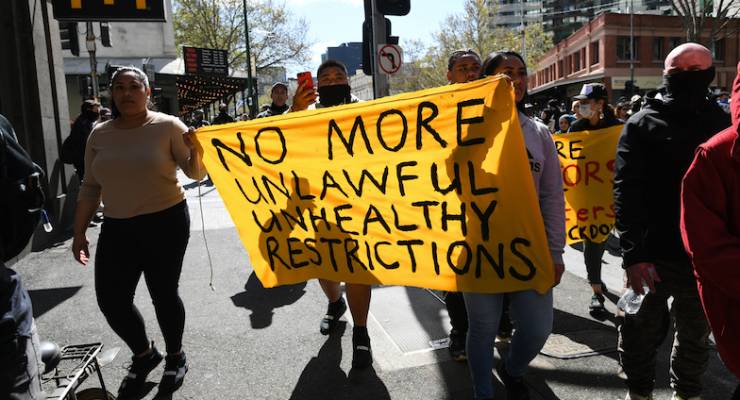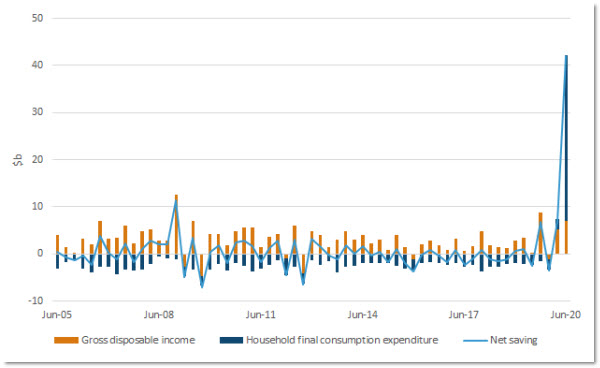
Rudolf Virchow, a 19th century physician and public health pioneer, once wrote that “medicine is a social science, and politics is nothing more than medicine on a grand scale”.
He was among the first to appreciate the profound influence of political decisions and public policy on health.
Virchow’s words resonate strongly as we see elected officials grapple with COVID-19. After all, medicine is a balancing act aiming to ameliorate illness without unduly harming the patient in the process.
The latest instalment is Victoria’s roadmap to reopening, which seeks to balance the need to reduce the second wave of the virus with the growing frustration and pressure to remove restrictions.
Reactions have ranged from criticism to praise and everything in between.
I think that the roadmap is a bad plan — except for the alternatives. The curfew aside, it’s the “least bad” strategy to get the state back on track. But the chance of success relies on improving testing and contact tracing and on additional financial support.
Elimination is best for health and the economy
COVID-19 is a nasty, highly contagious illness. Rather than being a binary decision, going for zero is the optimal way to:
- Minimise mortality, illness, and costs driven by greater demand for intensive care as well as costs incurred by non-COVID patients being denied or avoiding treatment;
- Enable a faster economic rebound on the other side.
Eliminating local transmission is eminently possible, as demonstrated in other states and territories. And let’s not forget that Victoria may have avoided this situation had the government not continued to ease restrictions during smaller surges throughout April, May and June (and had they better managed the quarantine process).
Having near-zero cases is especially important in Victoria, where the public health system is ill-equipped to manage a baseline infection rate and where targeted restrictions were unsuccessful. But maintaining near-zero levels will need more testing (including wastewater sampling) and better contact tracing.
On the economic side, forget spurious claims that low mortality correlates with higher growth (and the even more spurious implication of a causal relationship).
But the fact is that people are demonstrably cautious when a deadly virus is circulating in their community. Declines in economic activity occurs irrespective of official restrictions, and I’m yet to see convincing evidence suggesting that a mandated lockdown creates worse health and social problems than a self-imposed one.
This recession is due to a slump in demand driven by an exogenous reason: the virus. The economic slowdown caused by “letting it rip” (and going for herd immunity) is likely to go on for much longer than the slowdown caused by eliminating the virus altogether.
Reasons for economic optimism are emerging. Also, the recent national accounts show household savings increased three-fold as a proportion of income (from 6% to 19.8%) in the June quarter and are now up by a whopping A$42 billion to A$59.5 billion.

This reservoir was created by decreased consumer spending, an increase in income and recent benefits like JobKeeper. A decent proportion of this is likely to reside in Victoria.
That’s quite an amount of cash sitting on the sidelines for when things reopen. While not all of it will be spent on discretionary goods and services, of course, the more confident people are that the virus is under control and that ongoing risks are managed, the more likely they are to spend that money.
Based on the current timeline, the floodgates could open just in time for Christmas, while, for some, they already have.
But businesses and low-income households will need ongoing financial assistance to survive the coming months. Victoria’s new business support package is a positive signal, but state and federal co-operation will be critical, making the political shouting match between Canberra and Melbourne very unhelpful and, frankly, quite dangerous.
Hope without hype
Politically, the roadmap is important because it gives Victorians a light at the end of a tunnel — a tunnel that must be getting very dark indeed.
A key role of political leaders is to provide hope in difficult times. I think the roadmap does this but does it sensibly (curfew aside), managing expectations and not over-promising.
The use of dates has been criticised, and some feel that they are too conservative. I disagree.
First, a date is more tangible than a rolling average to the normal punter. The underlying message is clear: if things go to plan, we could be back to normal by Christmas.
Second, making the dates conditional on infection numbers is smart. It provides wiggle room if things take longer than expected. As to the proposed lengths of each stage, surely it’s sensible to under-promise?
The roadmap has also been criticised for being too complex. But this as a complex problem to which there are no simple solutions. Yes, perhaps the information could be displayed in simpler terms, with better-designed visuals, for example. But dumbing it down is not only patronising, it may well create a perception that the road is easier than it is. Over-simplifying it would also remove the rationale for amending the plan if the circumstances change.
The grim alternative
Opening up prematurely would see COVID-19 cases rise, resulting not only in many more deaths and the associated costs of contagion, but also in a prolonged economic slump through ongoing restrictions and consumer caution. That’s a grim alternative.
Elimination is the least-bad option and the right way to go. The Victorian roadmap is tough but it does the job of signalling that there is a plan, that it is realistic, that the restrictions are not indefinite, and that yes, there is a light at the end of the tunnel.
As a social medicine, it’s the one with the highest chance of success and the least ongoing side effects.








PS where are you getting your information that “restrictions are not indefinite” ?
This government is developing form.
Distressing and shocking as the curfew is, it makes sense in the broader context of the stage four restrictions. I have no doubt the overwhelming majority of thoughtful and engaged citizens would stay home as they were asked. However, that leaves the inevitable percentage of meatheads, drongos and tin-foil hat wearers who would pay no attention to such a request on the grounds of couldn’t give a stuff, but I need a packet of smokes, or it’s a conspiracy to inject me with 5G GatesBots. Anecdotally, these individuals appear to be prime spreaders, particularly given the virus seems to relish the company of idiots.Since a core element of the S4 strategy is to maximise social distance (horrible though this is), the curfew seems to be an effective instrument; blunt certainly, but effective nonetheless.
A sensible and very well argued position that acknowledges that economic consequences tie to action, not to policy. If you want people to spend, they need to feel safe to go out.
And that science has a political dimension, whether deliberate or subliminal.
It shows that you are an economist. My view as a doctor with public health qualifications is that elimination is unrealistic – in the history of mankind so far we never succeeded with any of the seasonal respiratory viruses. Temporary suppression is the best we can hope for – the only question is for how long and at what cost.
Experience with the oxford vaccine has shown that we cannot bet on a vaccine becoming available any time soon. Likewise, no good candidate for effective medication is on the horizon.
Victoria has effectively instituted a police state, possibly illegally extended its state of emergency, and de facto suspended democratic due process and human rights. Time will show how many small and medium size business have been ruined, how many livelihood s destroyed, and how many people suffered collateral damage through suicide, neglected chronic disease, and delayed diagnosis of serious illness. A recent report suggested that the 5 most common cancers have been diagnosed about 30 % less often since covid – suggesting we might end up with several thousands of “collateral victims”, possibly many more than actual covid victims.
When I treat my patients, after arriving at a diagnosis, the most important question is always which management will have the greatest chances of benefit and the least likelihood of harm. It becomes increasingly clear that the Victorian approach fails this simple test – it is more and more probable that the “cure” is worse than the disease. A more balanced approach eg as in NSW shows that under comparable circumstances, one can achieve comparable outcome without resorting to becoming a brutal ham-fisted police state.
There is evidence that the Victorian approach works. We have also got no community transmission in the ACT, NT, Qld, SA, TAS and WA. I deplore defeatism. As yet we have very little data on this contagion, yet in all the jurisdictions listed above, we have eliminated it. As an island nation we have every reason to think that w can eliminate it from the remaining jurisdictions of NSW and VIC – where current efforts are to be commended, having reduced daily infections from over 700 to less than 40 in just a few weeks.
As to ‘suppression’ : agreed. Perhaps I ought to admire your optimism but we’ll see when the States and Oz for that matter are candidates for ‘normal’ tourism once again.
If you think Victoria is a police state, perhaps you should talk to someone from Iran. Democratic due process has not been suspended. The extension of the SoE was passed by act of Parliament – not by dictatorial fiat. You might not like it but it is entirely lawful and within the constitution nevertheless. (Interestingly, most of the other states don’t have the same limits as Victoria does on the application of a SoE, perhaps they are also police states by your definition.) I also am sorry for the many businesses which might not survive this pandemic. I am also just as sorry for the many businesses that were destroyed by the bushfires last summer.
Do you mean the bushfires the state and federal government weren’t prepared for despite warnings and calls for more resources, making outcomes worse than they had to be?
There is really no evidence NSW approach is any better as NSW has not been challenged to the level of Vic. NSW has been lucky, thats all.
Absolutely right scrubturkey!
Fair enough Horst, but Professor Tony Blakey and Professor Raina McIntyre, who are our tow most eminent epidemiologist are advocating for elimination, and I believe Professor Mary McLaws isn’t averse to the idea.
And as we haven’t tried, who knows? I’ll go with the people who are the lifetime experts on these subjects.
Yes, that will mean no international travel and watertight quarantine, but that is doable.
> resulting not only in many more deaths
2% of infected. Compare that to cancer or any other major ailment.
> also in a prolonged economic slump through ongoing
>restrictions and consumer caution.
Which will run its own course whatever the programme.
> Elimination
Is NOT possible. Just take a look at the history of viruses. Smallpox, at best, is a special case. Like AIDS the virus will be around for a while but like AIDS the virus will come (just based upon history – including 1919) to be ameliorated over time.
I suggest that you look not to Australia but the countries that have been mentioned copiously on this topic for alternative strategies. For the moment, there can be no claim that xyz is the best option; at best the claim would amount to a value-judgement.
As an aside, I’ll add something to Herb H. before too long. I agree that the politics is dominant but that state of affairs will not last for ever. It is logically possible that the virus COULD reappear in WA at some time into the future. We will see. Agreed on the tracing – which is rigorous in Asia.
YOU are just in a bit of a panic, Luke, because you (selfishly?) think that you are going to be next when the social discipline falls apart (as the photograph illustrates). If your number is “up”, aside from basic precautions, there is nothing that can be done about it.
Also, don’t think that this will be the last transmission from animals to humans. For example, something x times as bad could occur on Xmas eve somewhere on the planet.
You’re just saying that because you’re in a bit of a panic!
Wrong again DB. I can’t recall the last time that I was in a panic.